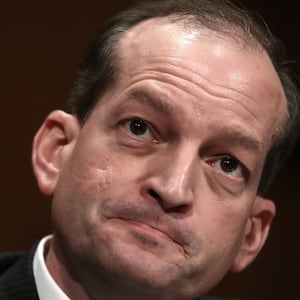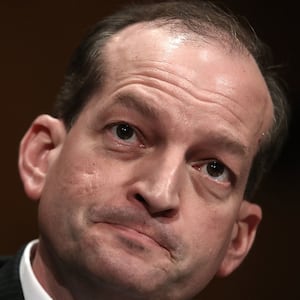Labor Secretary Alexander Acosta on Wednesday defended his role in the 2008 prosecution of Jeffrey Epstein, insisting that his office was actually “too aggressive,” despite giving the billionaire sex offender a secret plea deal.
“This matter was appealed all the way up to the deputy attorney general’s office. And not because we weren’t doing enough, but because the contention was that we were too aggressive,” Acosta responded to Rep. Frederica Wilson (D-FL), who called his actions “odious” at a House Education and Labor Committee hearing.
The non-prosecution deal between Acosta—then the top federal prosecutor in Miami—and the 66-year-old Epstein, a prominent financier accused of paying dozens of girls for sex and intimate massages, allowed the politically connected hedge-fund manager to plead guilty to two minor state charges and avoid any serious prison time.
Epstein has also been accused of molesting more than 100 underage girls in Palm Beach, Florida.
In exchange for the secret deal—which essentially buried dozens of allegations of child sex abuse and required Epstein to serve just a year in jail with generous work release—Epstein provided federal investigators with “unspecified information,” according to records first cited by The Miami Herald in a bombshell investigative report. The report details how Acosta and his team allegedly buckled under the pressure of Epstein’s defense lawyers, including Sexgate prosecutor Ken Starr and celebrity attorney Alan Dershowitz.
Virginia Roberts, who was 16 years old and working at Donald Trump’s Mar-a-Lago resort when she was allegedly approached by Epstein, told The Daily Beast that Acosta’s defense of the deal “is insulting, but not surprising.” Roberts alleges Epstein instructed her on how to perform oral sex before sending her to a private island to have sex with his associates, including Dershowitz.
In February, the Department of Justice announced an investigation into Epstein’s plea deal, and whether department lawyers may have “committed professional misconduct” during his prosecution.
“It is the department’s position in litigation that the Crime Victim’s Rights Act was not violated. I understand that the judge disagreed with the department’s position but we acted consistent with DOJ rules and protocols," Acosta said Wednesday.
Wilson, who used the Miami Herald report to grill the Trump cabinet member, did not seem convinced by his defense, arguing that Acosta acted “in blatant violation” of the Crime Victim’s Rights Act.
“When faced with criticism about this case, you have hidden behind prosecutorial discretion, that you were just part of a prosecution team. Your actions suggests that you had some confusion about which team you were on,” she said.
A Florida federal judge also concluded in February that Acosta—and his team of federal prosecutors who brokered the deal—violated the law when they allowed Epstein to avoid federal prosecution without telling his victims.
U.S. District Judge Kenneth A. Marra’s February findings concluded an 11-year investigation into Epstein’s plea agreement, ruling that Epstein broke federal law in 2008 by running an international sex trafficking operation that recruited underage girls, often bringing them to the U.S. from overseas.
“Epstein used paid employees to find and bring minor girls to him,’’ Marra wrote. “Epstein worked in concert with others to obtain minors not only for his own sexual gratification, but also for the sexual gratification of others.’’








